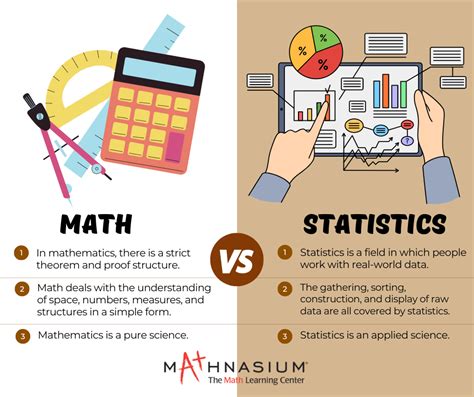The Great Debate: Statistics vs. College Algebra
Deciding between statistics and college algebra can be a daunting task. Both subjects play important roles in various fields and require a significant amount of effort to master. To aid in your decision-making process, we delve into the intricacies of each subject, highlighting their key differences and potential challenges.

Statistics: Unveiling the Hidden Patterns
Definition: Statistics is the science of collecting, analyzing, interpreting, and presenting data. It equips individuals with the tools to understand the world around them and make informed decisions. From healthcare to finance, statistics has a pervasive presence in modern society.
Key Features:
- Involves gathering and analyzing vast amounts of data
- Utilizes probability theory, hypothesis testing, and regression models
- Focuses on drawing meaningful conclusions from data
- Requires strong analytical and problem-solving skills
Pain Points:
- Large datasets can be overwhelming to manage and interpret
- Statistical software (e.g., SPSS, R) has a steep learning curve
- Misinterpretation of statistical results can lead to erroneous conclusions
Motivations:
- Statistics empowers individuals to make sense of complex data
- Opens doors to careers in data science, market research, and epidemiology
- Enhances critical thinking and decision-making abilities
College Algebra: Exploring Advanced Mathematical Concepts
Definition: College algebra extends the concepts of elementary algebra to more advanced topics. It covers functions, matrices, and complex numbers, providing a foundation for higher-level mathematics.
Key Features:
- Focuses on algebraic equations and their solutions
- Introduces the concept of abstract variables
- Explores the properties and applications of polynomials, rational expressions, and logarithms
- Enhances logical reasoning and problem-solving skills
Pain Points:
- Abstract concepts can be challenging to grasp initially
- Multiple steps are often required to solve complex equations
- Algebraic manipulation can be tedious and time-consuming
Motivations:
- College algebra prepares students for further study in STEM fields
- Provides a solid foundation for advanced mathematics
- Enhances problem-solving and critical thinking abilities
Comparative Overview: Statistics vs. College Algebra
| Feature | Statistics | College Algebra |
|---|---|---|
| Focus | Data analysis and interpretation | Algebraic equations and concepts |
| Skills Required | Analytical, problem-solving | Logical, problem-solving |
| Calculations | Complex, data-driven | Focused, algebraic manipulations |
| Applications | Real-world decision-making | STEM fields, advanced mathematics |
| Pain Points | Data management, statistical software | Abstract concepts, tedious calculations |
Which is Harder: The Verdict
Based on the comparative analysis, determining which subject is harder depends on individual strengths and preferences.
Statistics: Suitable for individuals who:
- Enjoy analyzing data and uncovering patterns
- Possess strong analytical and problem-solving abilities
- Are comfortable working with large datasets
College Algebra: Suitable for individuals who:
- Excel in algebraic manipulation and logical reasoning
- Have a strong foundation in elementary mathematics
- Aspiring to pursue STEM fields or advanced mathematics
Benefits of Mastering Statistics or College Algebra
Regardless of the choice, mastering either statistics or college algebra offers numerous benefits:
- Enhanced Problem-Solving Abilities: Both subjects foster critical thinking and problem-solving skills, enabling individuals to tackle complex challenges.
- Career Opportunities: Statistics and college algebra are essential for careers in data science, research, education, and engineering.
- Data-Driven Decision-Making: Statistics equips individuals to make informed decisions based on data analysis, empowering them in personal and professional spheres.
- Strong Mathematical Foundation: College algebra provides a solid foundation for advanced mathematical concepts, essential for STEM fields.
FAQs
1. Can I learn statistics without taking college algebra?
Yes, some introductory statistics courses are accessible without prior knowledge of college algebra. However, a basic understanding of algebraic concepts can be beneficial.
2. Which subject is more important for real-world applications?
Both subjects are important, depending on the specific field. Statistics is vital for data analysis in healthcare, marketing, and social sciences. College algebra is essential for engineering, physics, and computer science.
3. How long does it typically take to master statistics or college algebra?
The time required to master each subject varies depending on the individual’s learning style and dedication. Typically, a college-level course covering statistics or college algebra takes one semester to complete.
4. What are some careers that require statistics or college algebra?
Careers that require statistics include data analyst, statistician, market researcher, and epidemiologist. Careers that require college algebra include engineer, physicist, mathematician, and computer scientist.
5. How can I make statistics or college algebra more enjoyable?
- Find a good tutor: A skilled tutor can clarify difficult concepts and provide personalized support.
- Join a study group: Collaborating with peers can enhance understanding and motivation.
- Apply concepts to real-world problems: Make the subjects more relatable by connecting them to practical situations.
6. What are some creative new words that could inspire new applications for statistics or college algebra?
- Data Linguistics: The application of statistical techniques to analyze language patterns.
- Algebraic Optimization: The use of college algebra to solve complex optimization problems.
- Statistical Visualization: The development of innovative techniques for visually representing data.
